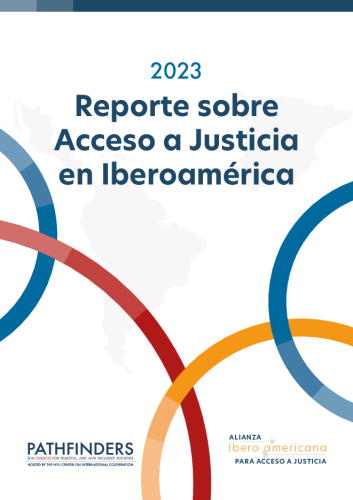Report on Access to Justice in Ibero-America

The Ibero-American Alliance for Access to Justice, founded in 2021 and formally established in May 2022, brings together key justice actors from Latin America, Spain, Portugal, and Andorra to promote people-centered justice in the Ibero-American region.
Its members include associations of judges, prosecutors, defenders, lawyers, justice ministry officials, civil society, academia and intergovernmental bodies.
The report is the first joint work carried out by the Alliance and provides a snapshot of the state of affairs in the region, including the:
- State of access to justice in Ibero-America and
- Efforts being made by actors in the justice ecosystem in the region to improve access to justice for all
It focuses on three different areas of endeavor: data and innovation, the regional normative framework and action plan for access to justice, and efforts being undertaken to leave no one behind (including women and girls; youth; the LGBTQI+ community; persons deprived of liberty; Indigenous populations, ethnic and religious minorities; migrants and refugees; and others).
Download the 2023 Report on Access to Justice in Ibero-America
La Alianza Iberoamericana para el Acceso a la Justicia, fundada en 2021 y establecida formalmente en mayo de 2022, reúne a actores clave de la justicia de América Latina, España, Portugal y Andorra para promover una justicia centrada en las personas en la región iberoamericana.
Entre sus miembros se encuentran asociaciones de jueces, fiscales, defensores, abogados, funcionarios de ministerios de justicia, sociedad civil, academia y organismos intergubernamentales.
El informe es el primer trabajo conjunto realizado por la Alianza y ofrece una instantánea del estado de la cuestión en la región, incluyendo el:
- Estado del acceso a la justicia en Iberoamérica y
- Los esfuerzos que están realizando los actores del ecosistema de la justicia en la región para mejorar el acceso a la justicia para todos.
Se centra en tres áreas de trabajo diferentes: datos e innovación, el marco normativo regional y el plan de acción para el acceso a la justicia, y los esfuerzos que se están llevando a cabo para no dejar a nadie atrás (incluyendo mujeres y niñas; jóvenes; comunidad LGBTQI+; personas privadas de libertad; poblaciones indígenas, minorías étnicas y religiosas; migrantes y refugiados; y otros).